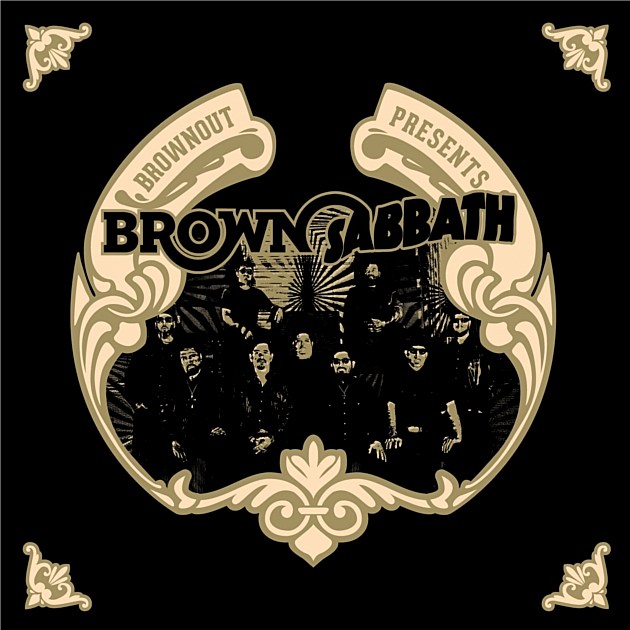
Brownout - Brown Sabbath

…
This could have been a disaster. Honestly, it probably should have been.
Even leaving aside for a moment the fact that most wildly out-of-genre covers (let alone an entire album of them) are piss-take gimmicks with a shelf-life approximately 30 seconds longer than the music itself, the idea of a Latin big band turning in a full set of Black Sabbath covers conjures frankly horrific images of a frontline of a dozen Maynard Fergusons on some sweaty cabaret stage, led by a betuxedoed Tito Puente.
Austin, Texas’s Brownout, though, walk this cornball minefield with professionalism and ease. They’re able to do so, largely, by sinking deeply into the spirit (if not exactly the sound) of these Sabbath tunes. Across its seven tracks, Brown Sabbath kicks up a grimy, funky, brass-heavy set of sweet summer jams that is more reminiscent of Mahavishnu Orchestra, electric Miles Davis, and prime early-’70s Santana. (Now, if those names made you run screaming for the exits, then I pity your joyless existence. Everyone else: stick around — the weather is hot but the drinks are cool.)
Paradoxically, the album is a success because of how faithful the band stays to the songs while at the same time transforming them dramatically. The real key to their success is knowing when and how to deploy the horn section. One can easily imagine an obnoxiously gimmicky version of this project where all of Sabbath’s rock instrumentation was replaced by wind instruments. Instead, Brown Sabbath balances their approach — they’ve still got someone on a drum kit; their bass guitar rumbles with a suitably hefty skronk; and their two guitarists luxuriate in Iommi’s riffs while goosing them into ever-so-slightly more swinging rhythms.
“Black Sabbath” is a revelation precisely because of this moderation in deploying the full flash of the horns. On the famous tritone opening riff, the horns only jump in to echo the octave interval after the fact, rather than doubling the riff in real-time. Later, when the snappy gallop enters — played completely straight by the guitarists — the horns tap in for a wink & nudge trade-off with the rhythm section before the whole band blares in a free-swinging jam section that feels like it might have always been there in the original, if only you had known how to listen for it. Elsewhere, the world-conquering opening riff of “Into the Void” is a perfect choice for a horn arrangement, as the bent-note trills of Iommi’s riffwork translate seamlessly into brass lines — particularly for the limber glissandos of the trombone. (Full disclosure: As a trombone player myself, my heart oozes with both joy and jealousy for Brownout’s trombone player Mark “Speedy” Gonzales, who’s responsible for all of the horn arrangements.)
As you sink deeper into the spidery percussion and jazz-noir vibes of Brown Sabbath, the out-of-genre nature of the covers actually begins to reinforce the universality of these timeless songs. Then again, the album’s success might also have something to do with canny timing, as the broader musical landscape has recently proven receptive to tangentially similar groups like Goat or the Budos Band. Interestingly, the tracks on Brown Sabbath with vocals turn out to be the weakest. It’s not that the vocals are bad — in fact, with three different lead vocalists on four songs, it’s impressive that their respective spins on passable Ozzy mannerisms don’t come across as wildly disjointed — but they are, at best, superfluous. The architecture of the arrangements is so strong that they hardly need that extra presence, although the shimmering haze of “Planet Caravan” deploys its watery vocals most effectively in service of the cover’s tasteful update.
Despite the fact that a few deeper cuts would have been welcome (six of the seven songs are drawn from Black Sabbath and Paranoid, and the last from Master of Reality — my personal picks would have included “Supernaut,” “A National Acrobat,” and “The Sign of the Southern Cross”), any petty complaints should quail in the face of how colossally fun this record is. Plenty of musicians have had the audacity to cover the original masters; few have done so as vividly, inventively, and satisfyingly as Brownout.
That’s what the world needs: musicians who just keep walking, spreading their magic.
…
…











